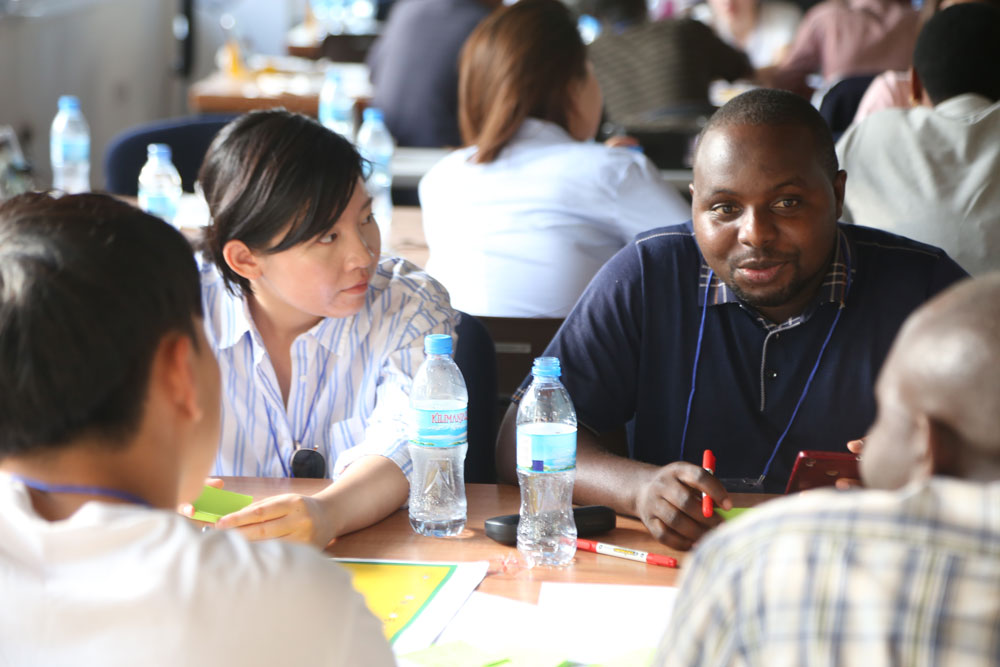- Yonsei UIC Students Tackle Social Issues in Tanzania with Design Thinking August 01, 2019
-
Design Factory Korea Social Impact Boot Camp held at Nelson Mandela African Institution of Science and Technology
Summer vacation is one of the best times to contribute and engage with the international community, as a group of Yonsei University’s Underwood International College students and faculty did last July.
Twenty-five Yonsei students and faculty embarked to Tanzania to participate in the Design Factory Korea (DFK) Social Impact Boot Camp held at Nelson Mandela African Institution of Science and Technology (NM-AIST) during June 31-July 8, 2019. Themed “Design Thinking for Social Innovation,” the four-day workshop aimed to create an opportunity for NM-AIST faculty and students to become familiarized with the design thinking process to tackle social issues in a practical manner.
On the other hand, Yonsei students gained invaluable hands-on experience on the reality of low-income markets in emerging countries and intense, albeit short exposure on how to promote sustainable development through international cooperation.
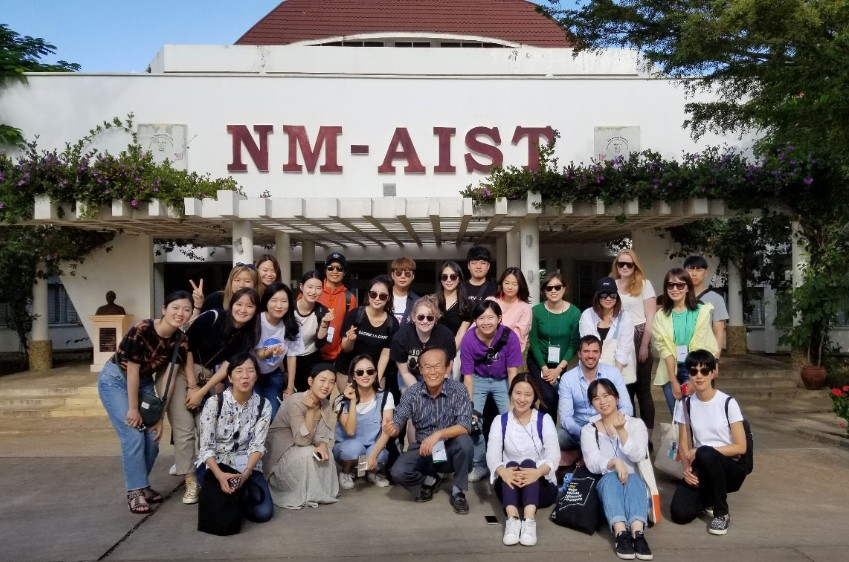 Group photo of Yonsei and DFGN participants at NM-AIST
Group photo of Yonsei and DFGN participants at NM-AISTAnchored at the Underwood International College (UIC) of Yonsei University, Design Factory Korea is the Korean member of Design Factory Global Network (DFGN) – an innovative and interdisciplinary network centered on “Passion-driven Learning” that provides solutions to practical problems that societies face through collaboration and inclusive exchange of perspectives from different backgrounds.
The DFK Social Impact Boot Camp in July was the end result of over three months of close collaboration among UIC, DFGN, and NM-AIST. In preparation for the workshop, the Yonsei team researched design thinking for the local market and customized three educational design toolkits – Persona, Appropriate Technology & Culture, Test - that accommodate the unique environment and culture of Tanzania.
Seventeen UIC and DFK faculty, students, and staff and five Design Intelligence majors of the Graduate School of Communication & Arts were selected and funded by Yonsei’s Institute for Higher Education Innovation, UIC and the Ministry of Trade, Industry and Energy of the Korean Government to attend the workshop held abroad.
Prior to the DFK Social Impact Boot Camp, the group visited E3Empower, a Silicon Valley-founded NGO for appropriate technology in developing countries, and the NM-AIST campus. Yonsei students referenced the success factors of how E3Empower develops and distributes reliable products made for the local people. At NM-AIST, the venue of the boot camp, graduate students of NM-AIST labs shared their research projects, of which, interestingly, the majority were closely connected to the immediate social issues faced by Tanzania.
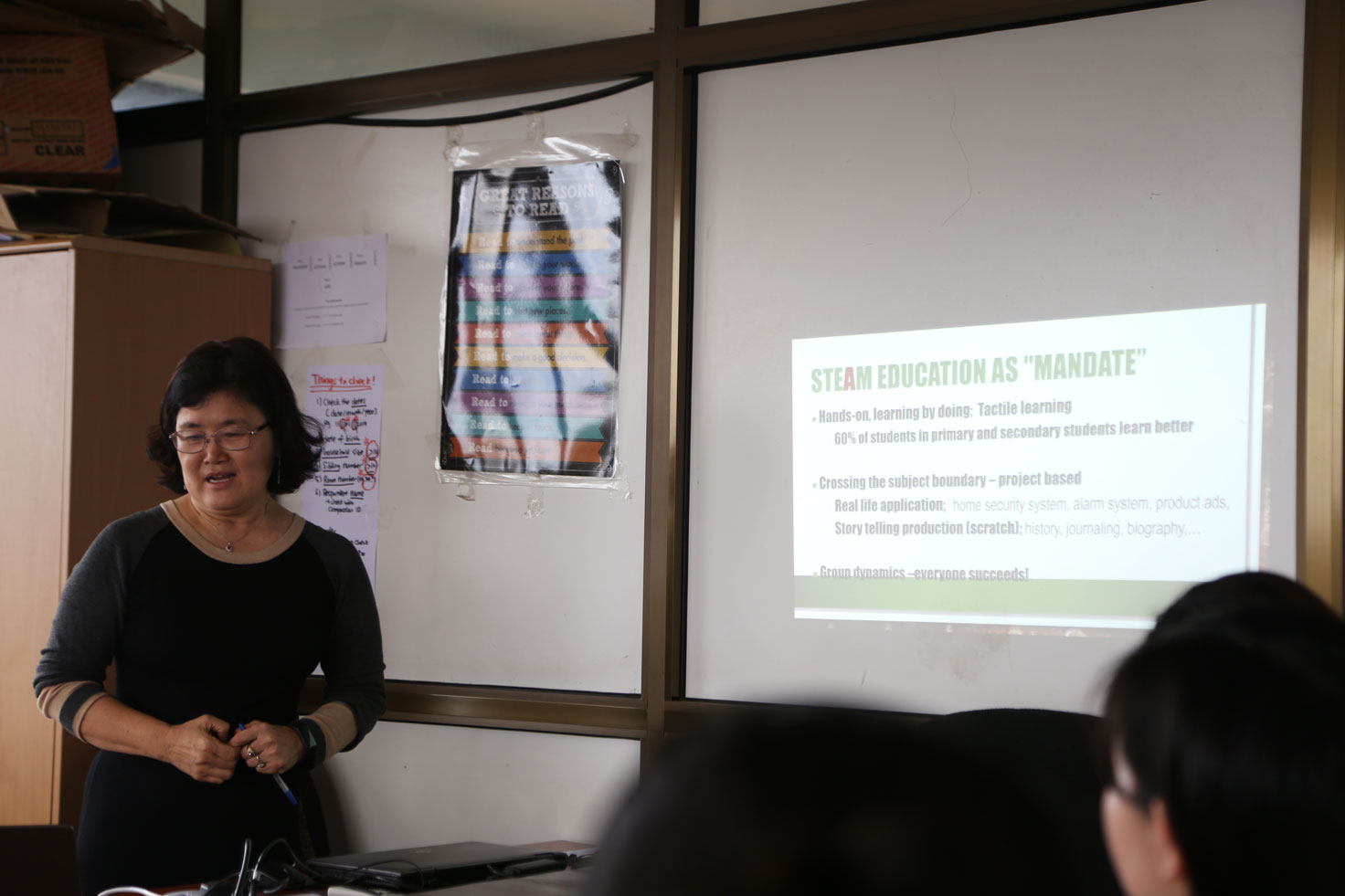
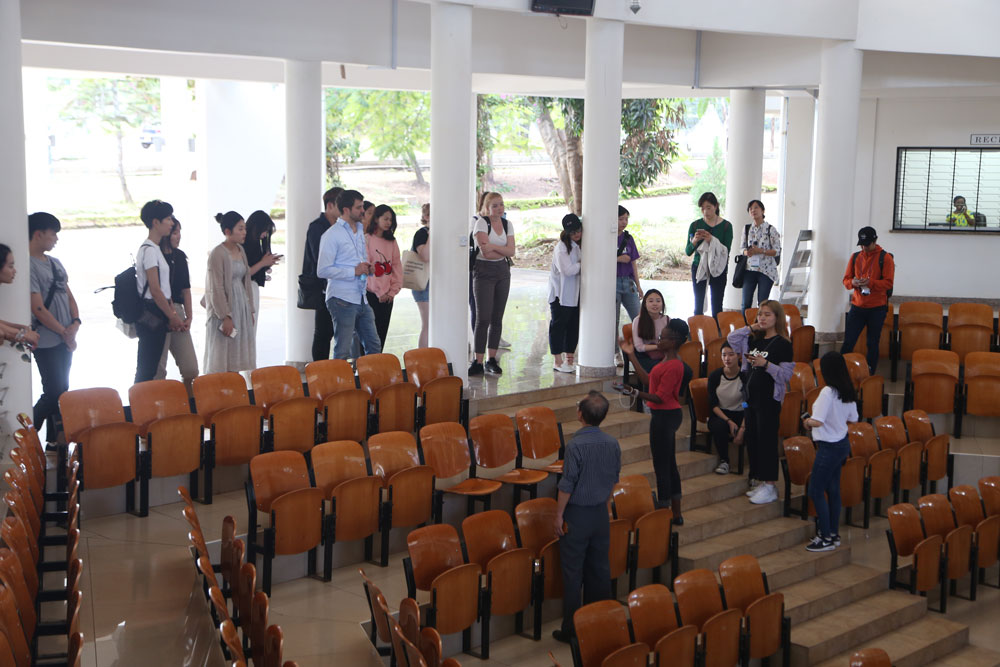
Visits to E3Empower office (left) and the NM-AIST campus (right)
With the official kick-off of the DFK Social Impact Boot Camp the next day, seven mixed teams of the Yonsei and NM-AIST students were formed to take on challenges faced by Tanzania which can contribute to the achievement of the United Nations’ Sustainable Development Goals (SDGs): Goals 1 (No Poverty), 2 (Zero Hunger), and 6 (Clean Water and Sanitation). Proposed by Dr. Hans Komakech, the Centre Director of Water Infrastructure and Sustainable Energy Futures (WISE-Futures) at NM-AIST, the two chosen challenges were clean water and water supply innovation and energy innovation to secure sustainable agriculture for small farms.
The DFK Social Boot Camp took on the design thinking process to address these two challenges by following six stages: Empathize, Define, Ideate, Prototype, Test, and Iterate & Refine.
Empathize
Led by Design Factory Group Network representatives Viljami Lyytikainen and Marthe Dehli, the participants’ first step was to understand the users facing the problems through visual storytelling and learn the skills needed for interviews and research activities with relevant experts and key stakeholders. The teams then visited the construction site of a water processing plant for five villages in Arusha and a village using the eWaterPay system to observe the equipment that supplies clean water as well as the current toilet system and its varying levels of cleanliness. They also visited the Tanzania-Korea Innovative Technology and Energy Center (iTEC) solar plant in Ngurdoto to learn how it improved the quality of life of the local community by supplying solar-powered electricity to its residents.
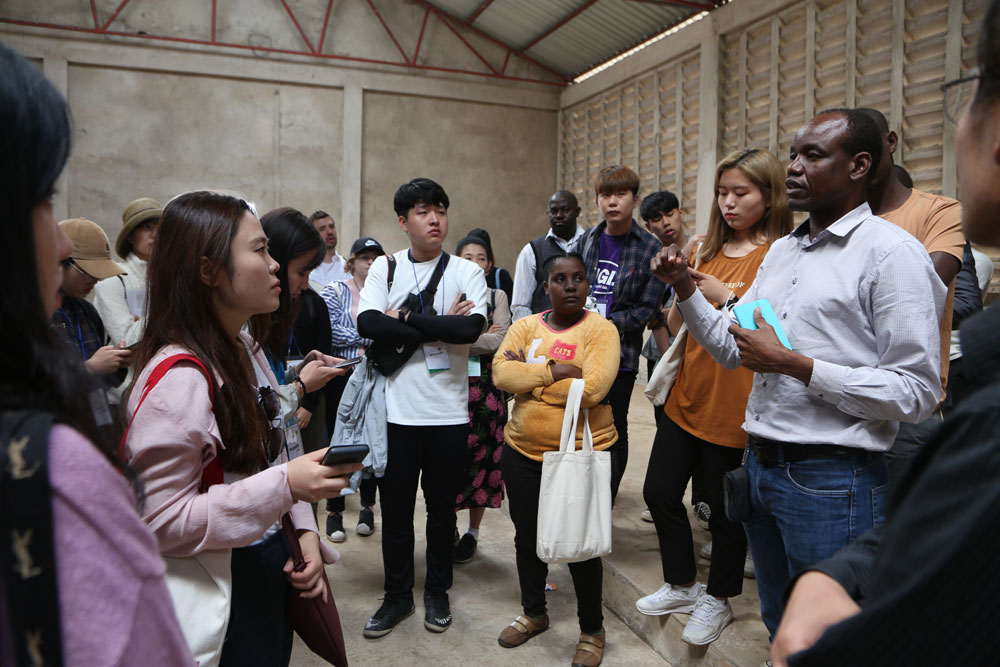
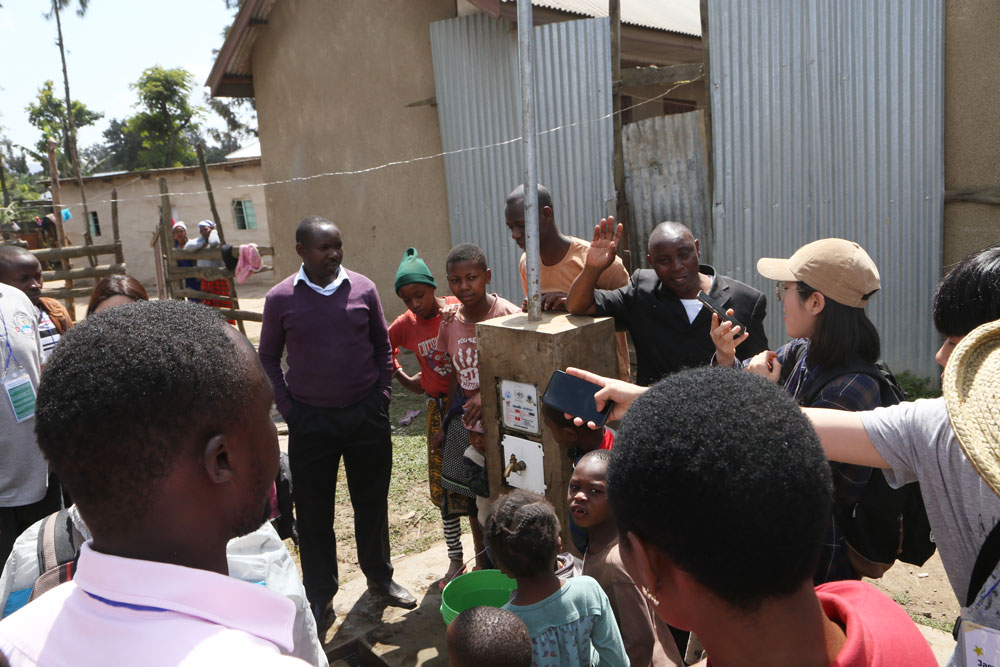
Visits to water processing plant construction site with Dr. Hans Komakech (left) and eWaterPay site (right)
Define
During the Define stage, led by Professor Younah Kang, participants defined and clarified the challenges people face by using the information they gathered from the interviews and observations at the Empathize stage.
Ideate
The teams spent hours pooling innovative ideas for the challenges in various ways, using the tool kits provided by Professor Soojin Jun. It was a timely opportunity for Yonsei’s students with design and business background and NM-AIST’s students with engineering background to share their perspectives and work off each other’s creativity and practicality.
Prototype
Then, with the guidance from Professor Keeheon Lee and DFK Coach Semina Yi, participants created a paper-based prototype and a storyboard based on their ideas derived from the Ideate stage. Through this process, they were able to materialize their ideas and address potential issues that may arise while using the prototypes.
Test
Each team was then divided into two small groups: one gave a presentation of the team’s prototype using the storyboard, while the other tested other teams’ prototypes and gave feedback. Conducted by DFK coach Semina Yi, the Test stage helped participants use the newly created toolkits to identify and discuss issues while creating visual comparisons of the prototypes before and after testing.
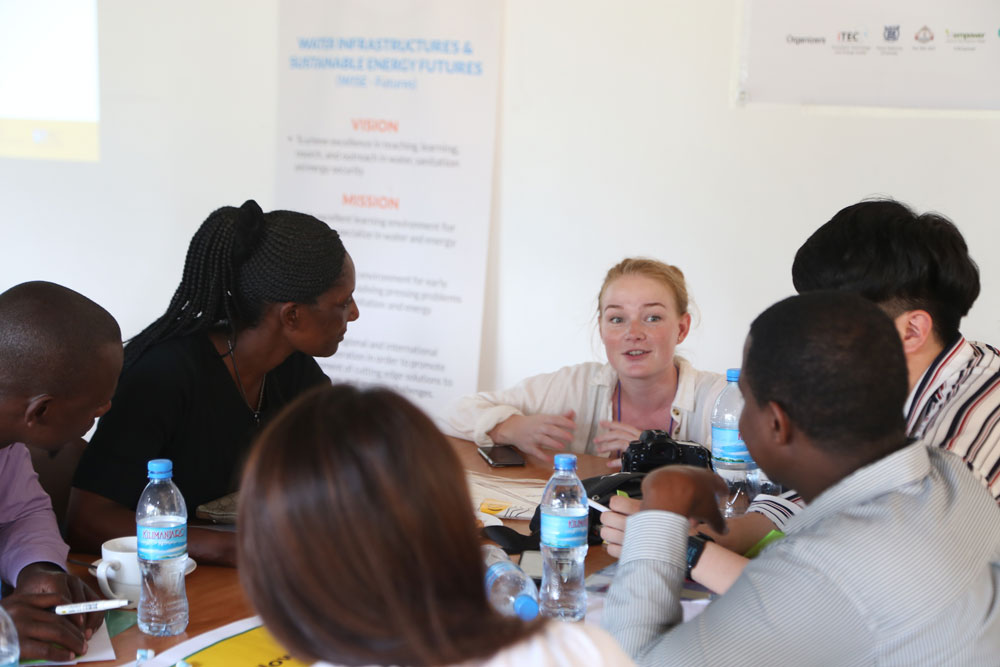
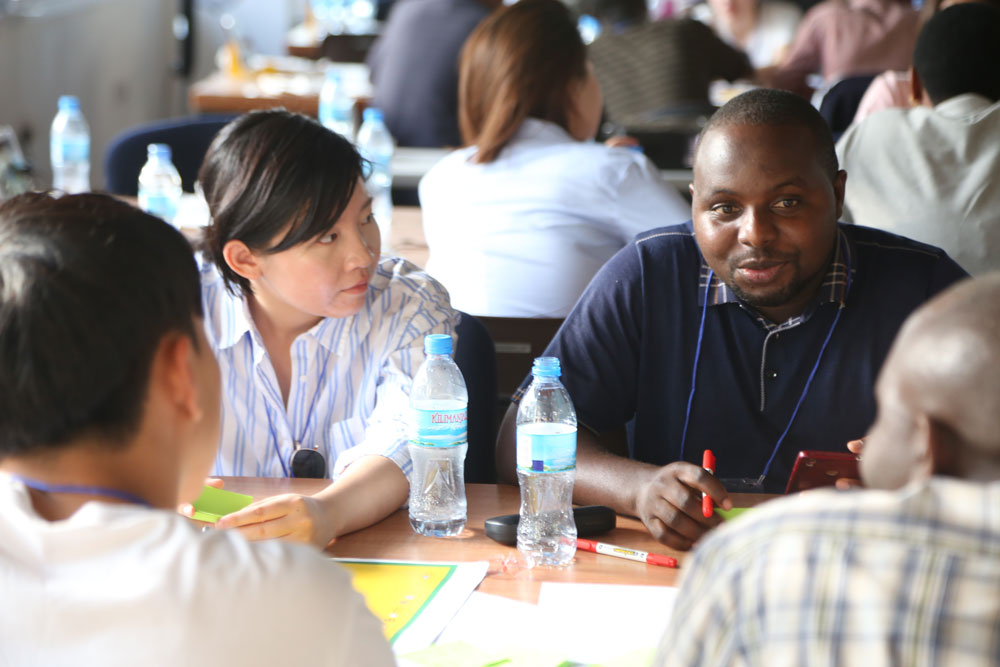
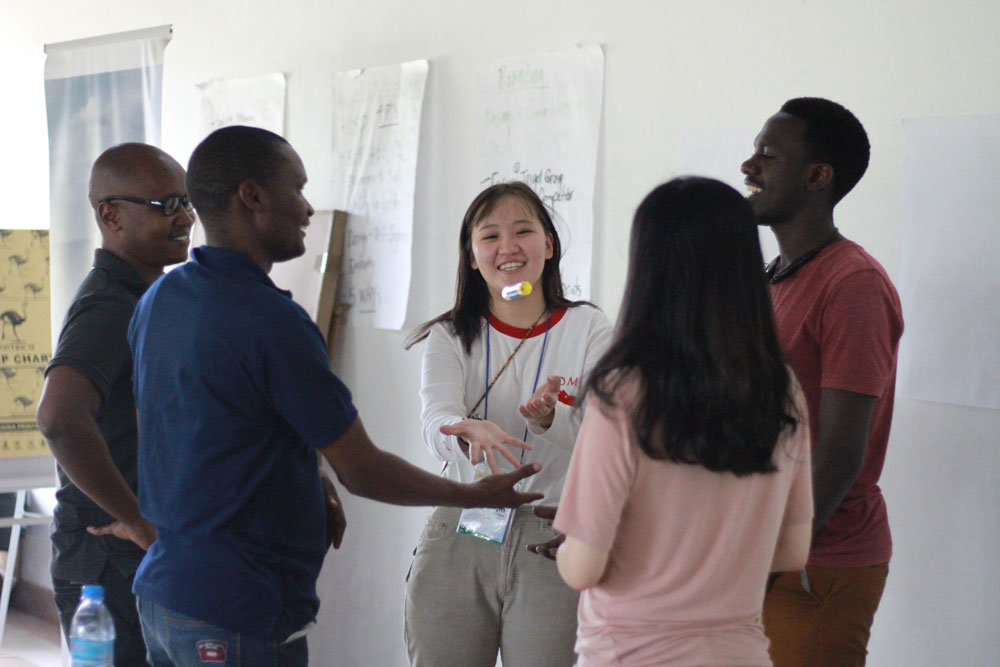
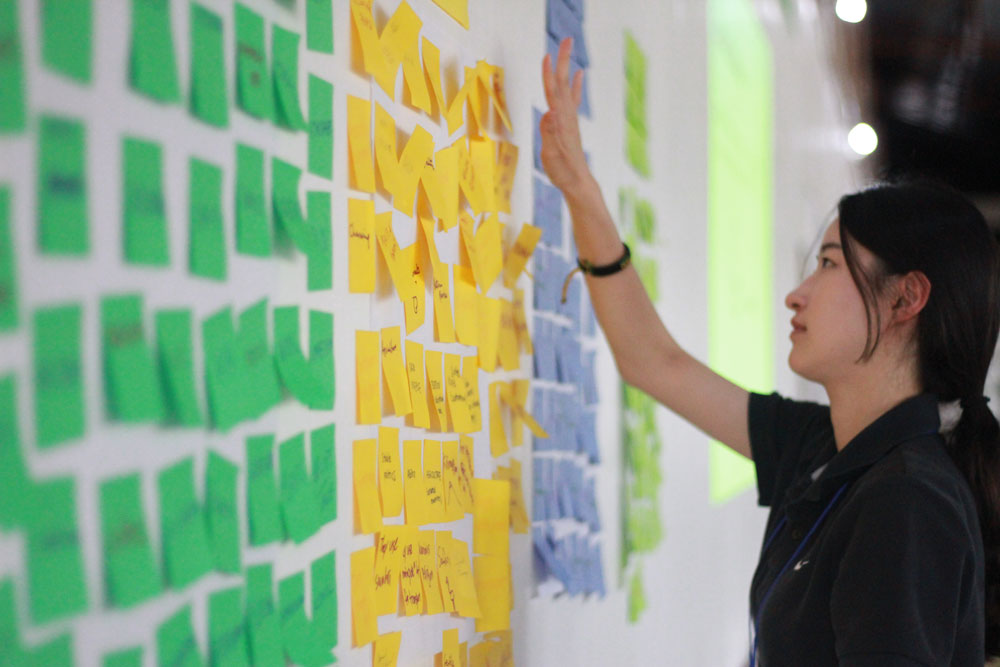
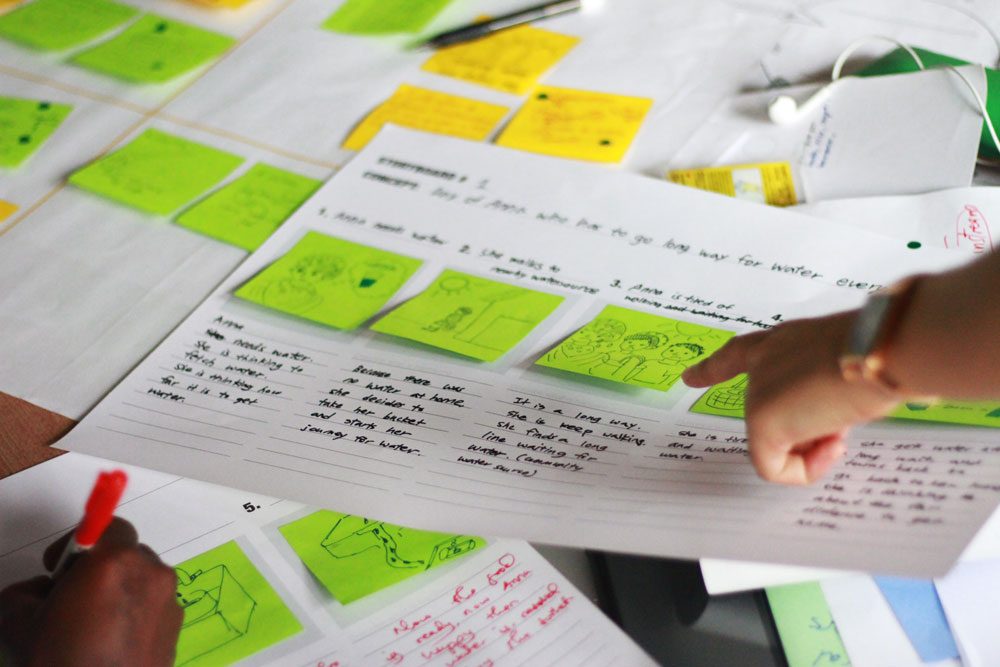
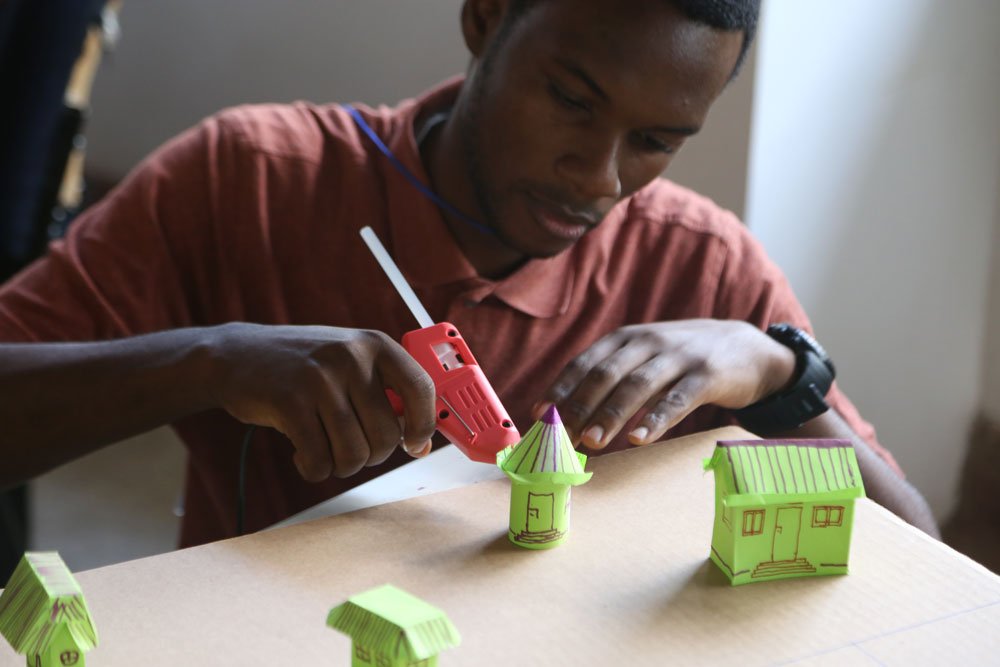
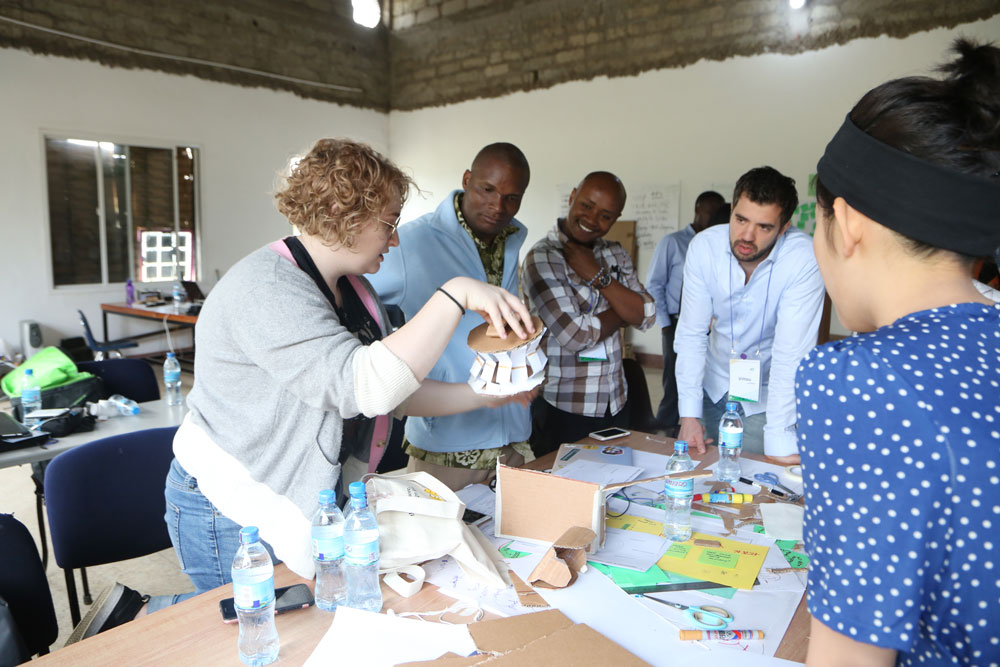
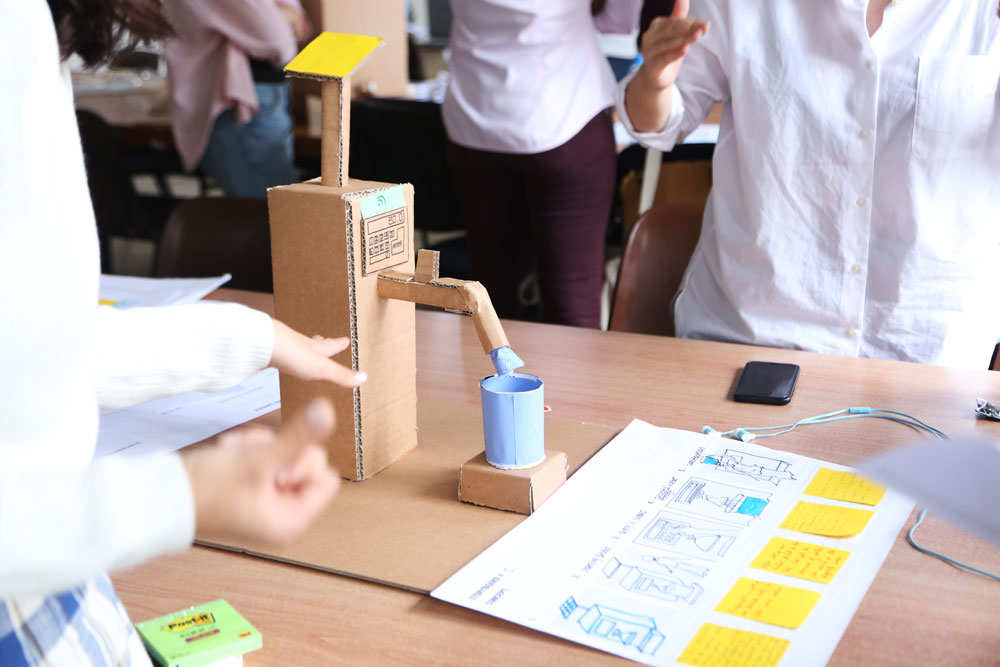
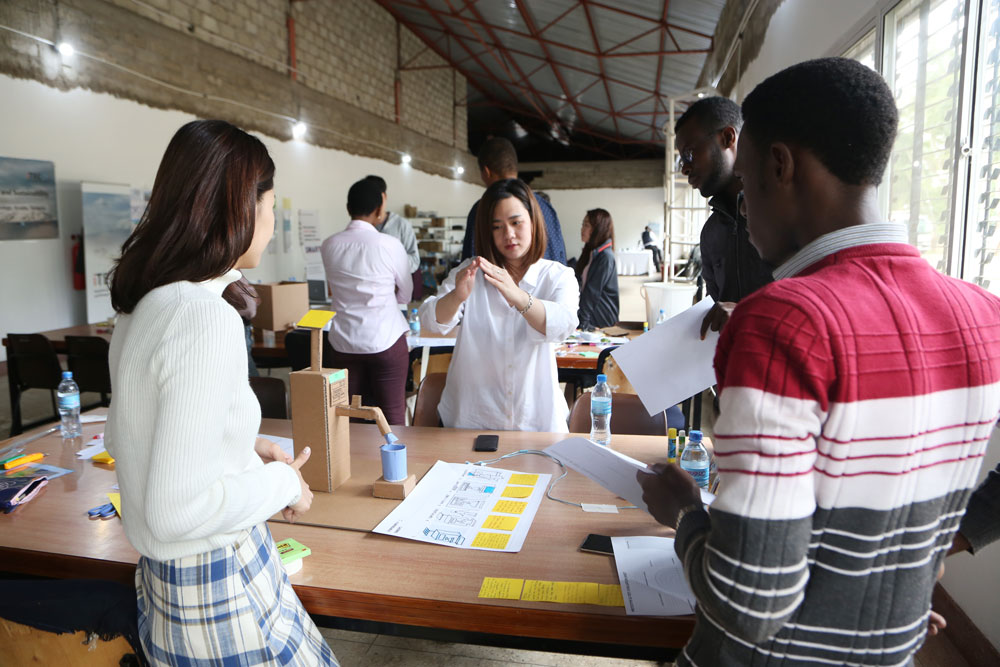
Scenes during the various stages of the design thinking process
Iterate & Refine
Each team complemented the weak points of their prototypes and built strategies based on the feedback they received during the Test stage. They also prepared presentations and visual materials for the final wrap-up.
For the Gala and exhibition event, each team gave a five-minute presentation and answered two questions, optimizing their time to delivering their ideas quickly and effectively. The observation panel included CEO Ji Young Rhee and Director SungSoo Kim of E3Empower, Director Herb Rhee of iTEC, and Centre Director Hans Komakech and Dr. Joseph Swai of WISE-Futures.
During the presentation, participants were able to share the solutions they efficiently created through the design thinking process during the intensive four-day DFK Social Impact Boot Camp.
“DFK Social Impact Boot Camp in Tanzania created a network beyond Korea to the African continent, establishing a unique infrastructure that can actively contribute to social innovation,” said DFK Coach Semina Yi. “It will have a great impact on Design Factory Korea and Yonsei University’s mission to educate global creative talent and pursue social contribution.”
Above all, the first week of July 2019 will be remembered as the balmy summer afternoons, during which NM-AIST and Yonsei faculty recognized future areas of collaboration. Ideas and solutions presented during the workshop will be addressed in the Social Innovation course taught by the DFK Director Junghoon Lee, which will be offered at Underwood International College this fall semester. Moreover, DFK Associate Director Semee Yoon had pitched the idea of introducing the first Design Factory in the African Continent at NM-AIST, utilizing public-private partnerships (e.g. KOICA and private firms) to improve the quality of learning on both ends.
This endeavor of Yonsei University, initiated by DFK of Underwood International College, will be one of many learning platforms, through which Yonsei students can use their creativity and critical ability to tackle issues of sustainable development, not only with neighbors at home, but also abroad.
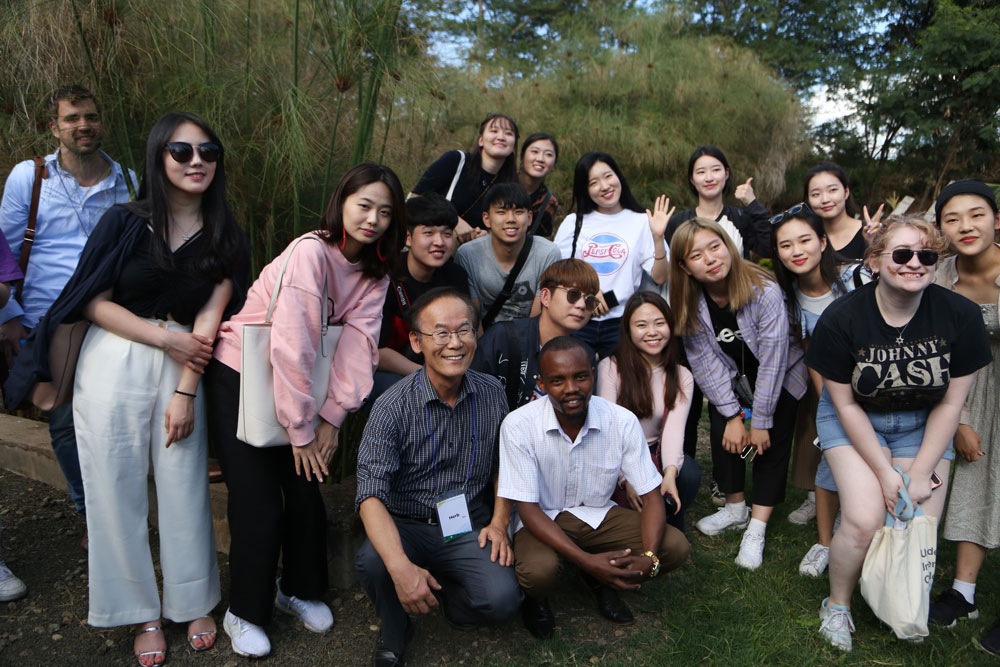
show mobile menu
mobile menu

